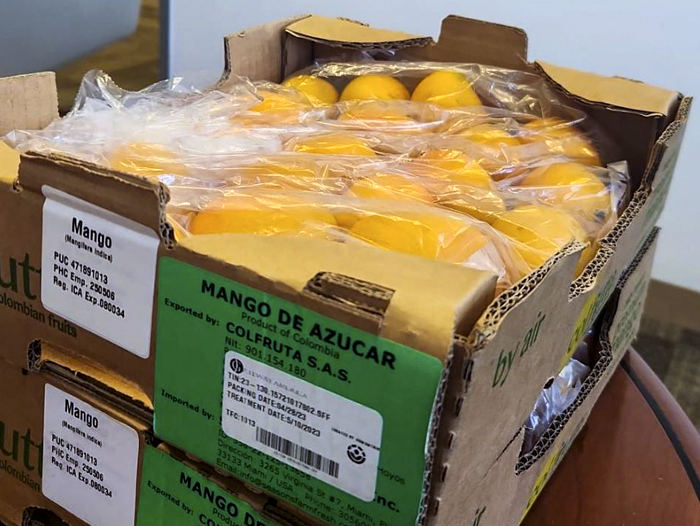Colombian Sugar Mangoes Are Now Available in the United States
May 25, 2023 | 3 min to read

Six thousand kilos of baby mangoes —a type of fruit that only grows in Colombia, South America— are being distributed from Dallas, Texas, throughout the country, reaching California, Miami, New York, and Washington D.C’s big chains.
Washington D.C. – The first time Colombian mangoes entered the US after obtaining access from APHIS was by the end of December 2022. Back then, it was the Keitt variety the one that entered the American territory; however, in the last few days, a new type of Colombian mango has reached multiple shelves across the US territory: the Sugar mango, a variety of juicy and extra-sweet fruit, with a flavor yet unknown to the locals’ palates.
It is worth mentioning that US consumption of mango has been skyrocketing in the last few years. According to the USDA, the United States registered a growth of 37% in mango purchases from 2018 to 2022. Most common mangoes varieties found across the American territory come from Mexico, Peru, Ecuador, and Brazil. “And, unless other growing and harvesting times are chosen, as well as larger plantations using hot water treatment facilities are installed, Colombia will have to compete with the common red mango from other origins,” explained Nick Bernal, director of the importer company Seasons Farm Fresh.
However, the story is different if we talk about the Sugar baby mango, as it is unique to the Colombian territory. Colombian exotic fruits have an excellent opportunity to integrate into the US supply network. “And especially, uncommon varieties, such as the Sugar baby mango, can be a turning point,” said Bernal, whose clients range from wholesalers to supermarkets and food services.
It’s not just the kind of mango that is unique. Colombia’s strategic location with port connectivity in the Pacific and the Caribbean Coasts makes buyers eager to explore the market. Bernal shared that his company seeks more Colombian suppliers because “The country is poised to be a major player in the US market. It also has good labor costs and the climate for growing produce year-round, which is very attractive.”
Colombia has made significant accomplishments in diversifying its agricultural offer as it has 108 fresh products with the green light to enter the United States. Amongst these are bell peppers, Hass avocados, goldenberries, blueberries, tangerines, oranges, pineapples, Tahiti lemons, and fresh herbs, all produced in different corners of the country.
“One of our government objectives is for the regions to spearhead the internationalization of fresh produce, companies, associations, and agglomerations. Through achievements such as this one, we aim at that purpose. The producing regions must become familiar with their export aptitude and start venturing into the internationalization process”, said the Minister of Trade, Industry and Tourism of Colombia, Germán Umaña Mendoza.
This shipment was possible “thanks to the efforts of the producer Colfrutta, who met all the market requirements and the interinstitutional work on sanitary and commercial issues. As a result, sugar baby mango will delight American palates,” said Carmen Caballero, president of ProColombia, the promotion agency part of the Ministry of Trade, Industry, and Tourism.
Colfrutta, the local producer of this mango variety, was founded in the north of Magdalena, a department in the Greater Colombian Caribbean. Since 2015, it has been sending mangoes to Europe and Canada, and thanks to foreign trade, it employs 60 families, mainly rural communities once affected by the armed conflict. “Exporting has given us the ability to directly and indirectly, help families that normally would not have a job, all thanks to the Magdalena mango that we have made famous across the rest of the world,” said Antonio Acosta, Colfrutta’s Exports Director.
“We celebrate the successful export of Sugar baby mango to the United States. This milestone has a positive and significant impact for producers in the Cordobita area in the department of Magdalena and represents a chance for new commercial opportunities in the United States for our producers in the rest of the country,” said Luis Gilberto Murillo, Colombia’s Ambassador to the United States.
Press contact: Catalina Sánchez Montoya – csanchez@procolombia.co
